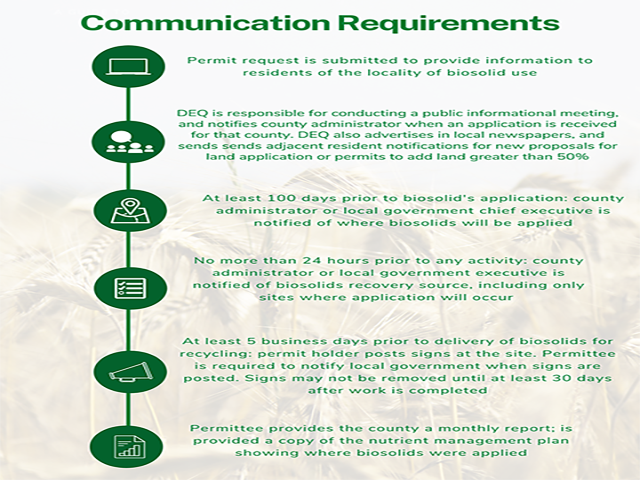As permits are discussed, promulgated, and decided in Virginia, there is always a discussion on transparency and involvement by the agency doing the regulating, and an interested public.
Biosolids, and the regulation of biosolids, is somewhat unique as a regulated material in that the regulations (9VAC25-32) contain very detailed notification requirements. The permitting of biosolids also require significant “regulated” communication, meaning the public, and local government representatives, are provided an opportunity to participate in the permitting of biosolids.
DEQ Required Communication
DEQ holds a public informational meeting for the initial issuance of a proposed permit, or when modifications to add land is greater than 50% of the existing permitted land. Citizens can submit written comments to DEQ when permits are promulgated for each of these two permit types if it receives 25 or more hearing requests.
DEQ holds a public informational meeting after a permit request is complete to provide information to residents of a locality about the permit. Citizens can also submit written comments to DEQ, and then the State Water Control Board can hold a public hearing if it receives 25 or more hearing requests.
DEQ also is required to provide notification the county administrator every time an application is received for a biosolids permit, or when a biosolids permit is received to reissue an existing permit.
For some draft permits, or the reissuance of permits, DEQ also does the following:
- Newspaper public notice 1/week for 2 consecutive weeks for initial permits or when more than 50% of land is added
- 30-day public comment period on the draft permits
- Send adjacent resident notifications (postcard in U.S. mail) for new proposals for land application or permits to add land greater than 50%
Public input can result in changes to the permit that is being requested. For example, the public input process gives citizens, and local officials, the opportunity to request extended setbacks around an application site, and DEQ may change the permit to accommodate these setbacks. Public input has in fact led contractors and landowners to change their permit requests.
Other notification requirements:
- At least 100 days prior to commencing biosolids application the permittee delivers to the chief executive officer/county administrator of the local government where the site is located. The notice includes the expected sources of the biosolids to be recycled, which also is provided two weeks before the activity.
- Not more than 24 hours prior to commencing any activity the permittee notifies the chief executive officer/county administrator of the local government identification of the biosolids recovery source, and this communication includes only sites where land application activities will occur or where the biosolids will be staged.
- At least 5 business days prior to delivery of biosolids for recycling the permit holder post signs at the site – and these signs must comply with regulations, and permittees are required to notify the local government when signs are posted. Signs are not to be removed until at leasts30 days after the work has been completed. application has been completed at the site.
Additionally, the permittee provides the county a monthly report; is provided a copy of the nutrient management plant that shows where biosolids are applied.
Local Option Monitoring Ordinance
The biosolids regulations importantly authorize a county to pass a local ordinance enabling it to assign a county employee to monitor the application of regulated biosolids.
County monitors can be especially valuable to a local government. Local monitors are A local monitor allowed test and monitor the recycling of biosolids to compliment DEQ inspections to ensure compliance with applicable laws and regulations. Monitors may also order the abatement of any violation of state regulations.
As part of this local option, DEQ collects fees from land appliers, based on the amount of biosolids applied to farms or forestland. These fees are used to reimburse local governments that choose to provide local oversight and monitoring while also supporting the cost of DEQ biosolids oversight. The legislative intent of the local monitor is to provide counties with more direct involvement and oversight to biosolids management in their respective county.
